#Prologue Analysis
Explore tagged Tumblr posts
Text

https://www.fogaminghub.com/post/explore-the-chilling-choices-of-until-dawn-s-prologue
🌌 Ready for a spine-tingling journey? In our latest blog post, we breakdown the choices you face in the prologue of Until Dawn. Follow Beth as she navigates through the ominous Washington Lodge and make decisions that may haunt you! Don’t miss out on the chance to influence this harrowing tale! 🔥💔
#Until Dawn#Horror Game#Video Game Choices#Beth And Hannah#Washington Lodge#Prologue Analysis#Survival Horror#Interactive Storytelling#Gaming Experience#Player Decision#Quick Time Events#Game Narrative#Character Choices#Death Totem#Clue Discovery#Immersive Gameplay#Chilling Decisions#Suspense Gaming#Narrative Driven#Emotional Gameplay#Video Game Community#Horror Adventure#Game Mechanics#Gamer Life#Psycho Horror#Choice Matters#Twists And Turns#Gaming Journey#Thrilling Stories#Dark Choices
5 notes
·
View notes
Note
watched kpop demon hunters bc of you and loved it! i think some of the themes overlap with twst and are executed pretty well. the idea that demonic, negative influence doesn't just manifest in and is fueled by cruelty to others but also in cruelty to oneself seems like it would resonate with a lot of the cast. internalized perception of self in which you are inherently bad due to having done something bad/being born that way which then in turn prevents you from doing good and consequently leading a good, fullfilling life is a seemingly simple concept yet a pretty relatable one imo. also jinu first telling a sugarcoated version and then feeling even worse because of it! circles of horrible coping mechanisms are circling.
was wondering if you might like to share some thoughts on the thematic similarities? either way, thank you for the endorsement of it! i was initially wary due to some viral clips being those fanservicy comedic moments so you were the one to convince me to give it a try.
[Referencing this post!]
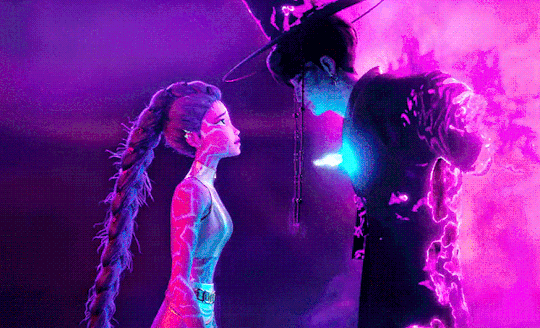
Yaaay 🎊 I am a positive influence for once/j!! hdwfejcmchevejkee I has skeptical of it too (mostly because the premise wasn’t selling me on it), but I’m glad I gave it a shot because KPDH really is such a gem 💎✨ The humor definitely isn’t for everyone; some friends of mine couldn’t get into it because they found the jokes too cringe or leaning too much into stan/celebrity worship culture. That’s okay, everyone has different opinions. The film has found its audience and they’re happy with it regardless ^^
I think part of what helped KPop Demon Hunters succeed is how far-reaching its message is. Its themes and story can be read multiple different ways, which are all equally valid. For example, many in the LGBTQIA+ community see the finale as a metaphor for Rumi coming out of the closet and her friends accepting her gender identity and/or sexuality. Remember how Celine kept telling Rumi to “cover up”, admitted she was getting over her own bigotry, and insisted Rumi could never talk about it? It gives similar vibes as shaming someone who wants to come out and confide in friends. Same goes for the scene when Rumi said she wanted “all of [her]” to be accepted, not for one aspect of her (ie her demon heritage or, in this case, gender identity/sexuality, to be conveniently ignored). Her demon markings going from purple to rainbow (a symbol commonly associated with the queer community) at the end is also cited as contributing to the coming out metaphor.
The same points I brought up in the previous paragraph could also be interpreted as an individual struggling with her mental health and becoming comfortable with revealing that to their friends. In this reading, Celine is an elder who doesn’t believe in poor mental health as a “real” illness, Rumi is putting pressure on herself to be “normal” or to “get better”, and the demons she fights are her literal “inner demons”. A third reading could be Rumi and neurodivergence (since I believe autism spectrum disorder is also associated with the rainbow).
KPDH can generally be read as a “person learning to entrust friends with their secret(s)” story too. However, this can also be interpreted as (more specifically) healing from generational trauma. I’m not sure hos common this take it, but it came up a LOT in my irl friend circles (which are predominantly composed of what are considered ethnic minorities in our country). Note that Huntrix are from a long line of demon hunters, are beholden to a duty or a legacy, and have an mentor from the previous generation that encourages them to keep to the status quo by concealing their weaknesses and flaws. Rumi is also shown to have a lot of shame regarding her markings, and shame is pretty prominently used to shame people into obedience or following outdated traditions or rules. By covering up these problems, ignoring them, and/or trying to “fix” them instead of talking about the problems, they are perpetuated.
With the film being about Kpop stars, another interesting interpretation presents itself: critique of the industry and the fandom around it. For example, Celine insists to Huntrix that their flaws and weaknesses must remain hidden. The fans are not allowed to see idols at their low points or making mistakes because it messes with the fantasy of perfection many idols have formed around their images. And if there is a mistake made or publicized? Those idols can take a DEEP hit and the fans can turn on them or seek out the next best thing real fast.
Our protagonists are a group that has a positive relationship with their fans. Huntrix’s music quite literally brings people together, as it is the souls resonating with their songs that provides the thread for the honmoon. The Saja Boys, who rival them in popularity, have a far more sinister relationship with their fans. They manipulate, take advantage of, and hypnotize people into becoming fanatics who will literally lay down their lives/souls for them. This reflects the toxic side of stan culture—when fans become TOO obsessive and go out of their way to defend anything their idols do or say. Furthermore, we see Huntrix and the Saja Boys see their fans very differently. Huntrix states both in the beginning and the end of the film that they love their fans. The Saja Boys are largely the opposite—4 out of 5 members immediately lose interest and slump once they leave the autograph signing and are out of the fans’ sights. Their love is fake and performative. In creating this parallel, KPDH shows us the power music has to be both a force for good and a force for evil, how there are genuine people and fake people alike in the industry.
Whoops, this became a KPDH analysis and not a Twst one—
The point is, I don’t think there’s one obvious way to see the film; people are going to get something slightly different out of it depending on their own experiences and perspectives. As for how these could relate to Twst… Well, let’s start with some of the things you pointed out.
You mentioned how cruelty inflicted onto others and to oneself are equivalent +
I don’t think there’s idea of being held back by the belief that one is “born bad” is super applicable to Twst in-universe. Very few of our main cast believes they are born evil (and even fewer see themselves as evil to begin with). Leona and Malleus were born with immense power, Jamil was born into an unfortunate legacy, and Vil was a child celebrity constantly type casted and convinced he was the same as the roles he played. I don’t think any of these guys (or other characters) necessarily have the mentality of “I was born bad, so I can’t be capable of any good.” Most of them try to do good or to earn respect via their actions (save for maybe Jamil, who again is just trapped where he is in the social ladder). However, that idea definitely relates on a meta level. The whole philosophy of Twst is to show that no person is entirely good or evil and asks us to give second chances to its characters no matter how terrible their actions or first impressions are. We’re not meant to see the boys as static, but rather as dynamic beings who can grow and change to become better versions of themselves.
You pointed out how Jinu sugarcoated his past, but I also want to add he wanted to erase it altogether. This is reminiscent of how Azul denied his past self and wanted to delete all records of it.
I remember seeing a Twitter post basically saying “we need the OB boys performing something like Your Idol” blow up. Honestly though?? I don’t think that song (or the vibes of it) fits them at all. It’s too… sinister and seductive. I do not realistically think any of them would say this kind of flirty wish fulfillment stuff in canon. Like, I think it fits a fanon version of the OB boys (especially the yumeshipping side of fandom) just fine, but not the canon versions. The only part of Your Idol that sort of resonated with particular Twst characters was Now we runnin’ wild / You’re down on your knees […] because it vaguely reminded me of Leona’s Book 2: Usurper from the Wilds and his UM chant, which involves a command to kneel before him. Even then, I find it’s a very threadbare connection.
I sort of got Leona vibes from Golden too, but primarily the opening portion:
I was a ghost, I was alone
In the darkened abyss
Given the throne, I didn’t know how to believe
I was the queen I was meant to be
If you swapped out “queen” for “king”, I would 100% believe Kingscholar wrote that verse. It even mentions the ABYSS, which is the term Leona coins for the deeper dreams the darkness drags the OB boys into in book 7. And the THRONE??? One he doesn’t believe he deserves? C’mon now, that’s for Leona written all over it 😭
The song I actually think best represents the Twst boys—and, more specifically, the OB boys—is This is What it Sounds Like. I feel like this is the least talked about of the KPDH’s original songs, which is such a shame because I really love it and think it represents the characters’ growth so well.
Here’s a breakdown of the relevant lyrics and how I see them relating to the OB boys:
Nothing but the truth now
Nothing but the proof of what I am
The worst of what I came from, patterns I'm ashamed of
Things that even I don't understand
This phrasing automatically makes me think of the boys confronting their OB selves + Phantoms in book 7. They are quite literally facing down their true selves, proof of the darkest and most ugly parts of their personalities, the “worst of what [they] came from”, things they are ashamed of.
I tried to fix it, I tried to fight it
My head was twisted, my heart divided
My lies all collided
These read to me like each individual OB boy’s attempts to cope with their past trauma with various methods. For example, Riddle adopted his mother’s mentality, Leona tried to rebel against the expectations placed on him, Azul toughened up and became a bully instead of the victim he once was, Jamil attempted to free himself by manipulating others, Vil worked his ass off to prove himself, Idia became increasingly lonely and withdrawn, and Malleus used disaster-level magic to stop the flow of time. In most, if not all, of these cases, the boys actively lied about themselves and/or pretended to be strong instead of confessing to their weaknesses and seeking help.
Brownie points for these lyrics saying TWISTED 😭 It just so happens to fit with Twisted Wonderland so well.
I don't know why I didn't trust you to be on my side
Twst has been pushing the power of friendship since the prologue. We are told that NRC students are prideful and want to get things done themselves. It’s not until maybe late book 6 when we start to see the students working together and trusting their peers to fight alongside them or to stand beside them as equals. This trend continues into book 7, where we see various dorm members jumping after their dorm leader to help them (when they NEVER would before) and the dorm leaders trusting their members to support them. For example, Adeuce absolutely REFUSE to follow Riddle’s command to abandon him and to save themselves, and Azul + the twins trust he can make it out of his abyss on his own—he is no longer weak. There has been such a clear change in dynamic among the students from the prologue until now.
I/we broke into a million pieces and I/we can't go back
But now I'm/we’re seeing all the beauty in the broken glass
A very prominent and recurring motif in Twst is mirrors. These lyrics make me think of the mirrors in the Mirror Chamber all shattering. Broken mirrors result in 7 years bad luck and ruins the images of the students reflected in them. By every account, this should be considered a bad thing—but in a way, it can also be considered triumphant and hopeful.
A broken mirror is not nice to look at and the shards hurt if they pierce you. It’s literally something ugly and with the capacity to harm, a truth that brings you pain if you acknowledge it. But look again, and you’ll see your image is still there. Many smaller, fragmented versions. Bite-sized pieces of the truth, presented in a more digestible manner. Little by little, you start to appreciate what you see there. Again, it’s like the OB boys staring at all their fears and insecurities—but in facing them, they see how far they’ve come since.
I think this message is particularly powerful for Azul, who has a lot of shame associated with his youth. The day when he can look back fondly on his childhood and accept every part of himself, including the rotund crybaby he once was.
The scars are part of me, darkness and harmony
My voice without the lies, this is what it sounds like
The “scars” here are not literal, but moreso a representation of each person’s trauma. Our negative experiences shouldn’t entirely define us, but they are always going to be an aspect of us. A lot of the reason why the OB boys are the way they are is due to those experiences in their formative years. The bad is there, yes—but so is the good. Both darkness AND harmony are a part of them, and the moment they can admit that to themselves, they can be authentic and open with who they are.
Why did I/we cover up the colors stuck inside my/our head?
I/We should've let the jagged edges meet the light instead
Show me what's underneath, I'll find your harmony
The song we couldn't write, this is what it sounds like
Really beautiful imagery aside, I think this could be interpreted as the boys realizing they should put aside their difference snd come together. Each dorm is represented by different colors—so let those colors merge, not remain covered or isolated. You have jagged edges (ie you have trauma and issues?). Be open and vulnerable about them. Unite with your peers instead of pushing them away. Show them what’s beneath your proud exteriors, show them your good traits too!!
We're shattering the silence, we're rising defiant
Shouting in the quiet, you're not alone
We listened to the demons, we let them get between us
But none of us are out here on our own
Again, this touches on the theme of coming together—something set up since the prologue. In this case, the “demons” are not literal, but instead refer to dark thoughts that someone may be dealing with on their own. It’s a difficult task, but, as the lyrics point out, everyone is dealing with their own “demons”. It is this shared sentiments that gives the Twst boys common ground to stand on. Knowing that, it also grants them the strength—through numbers, through social support—to “[rise] defiant” against it.
So, we were cowards, so, we were liars
So, we're not heroes, we're still survivors
The dreamers, the fighters, no lying, I'm tired
But dive in the fire and I'll be right here by your side
This parallels the OB boys confessing to their failures and shortcomings. They lied, cheated, manipulated, and sooo much more. They admit to not being good guys, that they’re not worthy of being called “heroes”—yet they still survived for this long, and that, in of itself, is a commendable feat. They still have their hopes and dreams, and they’re still willing to fight for them. This point is especially salient because the OB boys all reject the dreams Malleus presents to them and want to actively fight for the right to make their own futures.
The “dive in the fire” part doesn’t have to be an actual fire; it could just mean a tough situation. In the case of the Twst boys, it CAN be an actual fire. More specifically, Malleus’s. I think of how the students had to take turns whittling him down by dorm. We get several moments of them struggling to hold the line, but they’re able to do so only because they have their dorm members by their side, thus affirming the fact that there is strength in togetherness.
Fearless and undefined, this is what it sounds like
Truth after all this time, our voices all combined
When darkness meets the light, this is what it sounds like
A summation of everyone uniting and sounding so much more confident in doing so!! (“When darkness meets the light” refers to when trauma, secrets, etc. are finally exposed and shared with others. There’s nothing to hide anymore, and that’s framed as a good thing.) The ultimate goal in Twst; no further comments.
#twisted wonderland#twst#disney twisted wonderland#disney twst#notes from the writing raven#kpdh#kpop demon hunters#rumi kpdh#jinu kpdh#celine kpdh#kpdh spoilers#kpop demon hunters spoilers#Riddle Rosehearts#Leona Kingscholar#Azul Ashengrotto#Jamil Viper#Vil Schoenheit#Idia Shroud#Malleus Draconia#book 1 spoilers#book 2 spoilers#book 3 spoilers#booo 4 spoilers#book 5 spoilers#book 6 spoilers#book 7 spoilers#twst analysis#twisted wonderland analysis#prologue spoilers#kdh
74 notes
·
View notes
Text
Thoughts and musings on Prologue while playing NG+ (I tried not to repeat what I saw other people have already noticed)
Part of it is foreshadowing later Acts, not just establishing the game's themes. Huge spoilers after the cut
Is it meta, or am I mad, that Gustave's rocks never hit the Paintress (because he never does reach her or even gets close to her in the end) and that he often does not finish his sentences? It gives off a sense of unfulfillment, as his life is literally cut short at the end of Act 1
pointers to Maelle being 'special' are all over the place, e.g. "Stubborn people change the world" (and Maelle becomes stubborn just as Gustave, like I said already), "There are some special people in this one [expedition]", "Some of you are leaving to change the world" (camera pans at Maelle smiling).
continuing, during the speech when Emma says "Others to discover the secrets of our universe." the camera shows Lune, and at "Others to find meaning in our all-too-short lives," it focuses on Gustave. Ouch, the foreshadowing.
Gustave and Sophie express wishes for "another path", "another future", "in a different world" - possibly hinting at Maelle's ending?
there are lots of abandoned pianos everywhere (branded Mr Playthieu). I can imagine Verso secretly playing them when everyone's gathered for the Gommage
When fighting Sophie as Gustave, she enters a fencer pose similar to Maelle's. It's nice to imagine them practicing together, even if Sophie never went to the Expedition Academy (god forbid girl has a hobby)
Sophie about the new opera painting, "It’s nice… to know something of us will remain in the world after today." just like Verso's canvas was all that was left of him asdfghjhkl
do they gather the flower necklaces each year from the people who Gommage? ok im gonna cry
the flower petals are everywhere. The moment I realised people turn into chroma and petals during Gommage, I tried to avoid stomping on any petals on the ground. futile task.
is the same song (Lost Voice) playing when Sophie gommages and during Gustave's funeral? forever together, even in death
"Grieving alone is the worst" here it is, people, the message of the game
(Alan, who had a fight with his daughter, says) "It's ok. She doesn't get to understand. As long as she gets to live" hmm, would it reflect Renoir's stance on Aline/Alicie late game? Readiness to be hated as long as it saves the one you love
(Emma) "We’re her guardians, not her jailers." the topic of Maelle's agency and ability to make her own decisions comes up so early. Already here you can argue if it was good/bad to let her make her own decision to join the Expedition, just as you can debate whether it is good/bad to let her make her own decision to stay in the Canvas, all consequences included
Wonder what else is there in this short hour of a gameplay.
#clair obscur: expedition 33#expedition 33 spoilers#exp33 analysis#maelle#gustave#verso dessendre#maelle’s ending#versos ending#expedition 33 sophie#expedition 33 prologue#expedition 33 meta
41 notes
·
View notes
Text
I've been reading the original Hush story line this week and it makes me think about The Waynes in general a lot.
A running thing with Thomas in that story is that he's depicted as a very uptight, stereotypically formal old-money rich guy. It's to the point where they call out Tommy Elliot treating him with any amount of casualness/informality as really bizarre or daring, and pose the idea that Thomas is a limiting factor in Bruce's upbringing ("'My dad said'-- 'my dad said'-- is that really how you're gonna live your whole life, Bruce?").
And then you compare with how Scott Snyder writes him and Martha in his run of Batman and its like. WOW. I love these people. Thomas is an active and engaging parent in his kid's life, they both have a personality and a sense of humor that is so dissonant with how Bruce is as an adult that you can't really believe that these are the Batman's parents.
It's exactly the reason why I love this version of them, cuz I think it definitely does make their death all the more tragic. Makes you think about how drastically different of a person Bruce would've been – was supposed to be – had they lived and gotten the chance to raise him.

// Batman: Zero Year (2013)
#i think it makes the prologue to hush have more oomph to it yknow???#cuz it starts with alfred mourning the loss of the man that bruce could've been had they not been murdered#but ironically imo it seems that bruce wouldn't be all that much different personality wise#and he learns a great deal of empathy/morality as a consequence of their death#they explore the reality of the waynes surviving in other comics and bruce is like. a huge asshole and a kiss ass to his dad so yknow.#alfred you got the good ending trust me /lh#dc comics#batman#batman comics#dc#batman hush#batman zero year#thomas wayne#martha wayne#character analysis
30 notes
·
View notes
Note
hi!! i’m a relatively new omori fan (a brainrotted fan, however, with 140 hours in the game so far… and 98% completion bc i lost to the recyclepath.. -_-) anyway, i love your analysis posts, you’ve clearly studied the details of this game very well!!
i was hoping to ask about the timeline of white space and headspace creation, if you have the time and would like to! my roommate and i played together and have tried to piece it together a few times over the four playthroughs we’ve done (two of each route), but there are still some details that seem contradictory to me. i’m sorry if this is obvious though!
so the transcript of the truth album says “you sink into a crevice in your mind… an empty white room” so i initially assumed white space was created on the day of the incident, in that dissociative state while mari was in the bed. you also see this in the sequence after three days left before going back into headspace where it’s sunny and basil in front of the door, then sunny in white space, then the manifestation of omori. of course, we’ve also been told “you’ve been living here for as long as you can remember”, but we can assume the “you” is omori instead of sunny, which makes sense if he was created in white space
however. in the lost library we see that sunny used to explore headspace during school, presumably before the incident, and daddy longlegs says “in the beginning, there only existed two... the dreamer and his room” and then “the dreamer grew weary of his room and created a door that led to many different worlds”, referring to white space and headspace, so white space existed first. so white space existed before the incident.
so then the white space reference from the truth album is maybe about the manifestation of omori, instead of the creation of white space. i think the outfit sunny’s wearing in the omori cut scene is also the same as from the day of the incident (the black tshirt & shorts). so presumably (before the incident), sunny used to explore headspace as sunny instead of as omori.
daddy longlegs then goes on to talk about black space, and how omori was created to let sunny “ascend to a blissful state of ignorance” and “forget himself” (this also prompts an interesting question of how sentient omori is — because he’s the protector (& knows enough to be willing to kill basil) but he’s also “ignorant of his own fabrication”, according to daddy longlegs, but i guess that’s another matter entirely!) black space was created in response to trauma, so that again supports the idea that omori was manifested after the incident.
so then white space. a place to survive but not to live. the black lightbulb is the repression of an idea, ie, the lightbulb was created after the incident. but sure, white space can exist without the lightbulb. my question then is, why did sunny need a place to survive before then? we could say that dissociation has always been his go-to reaction in stressful situations, and that’s why. but he was also in white space long enough to get bored of it, enough to conjure headspace.
we have a few vague clues that sunny & mari’s home life could have been bad, but nothing concrete. and personally, i’m of the opinion that his life being more or less ideal to begin with enhances the tragedy of the story (as well as him and basil having opposite tragedies, as i saw someone else point out — sunny’s being that he was already very much loved & cared for, so it’s worse when it’s taken away, basil’s that he never had that in the first place), but i guess that’s up to interpretation. other than home life issues then, just the stress of the violin? general developmental issues? depression? something else?
i’d be super curious to hear what you think (again, if you have the time)… thank you! :)
Hi there! Sorry about how long this took me, I've had a lot going on + I actually wrote a whole long response that took me like a week of on and off working, and then I accidentally shut off my computer and lost the whole thing :(
I want to start this off with a couple disclaimers: Omori intentionally keeps its timeline close to its chest (presumably to add to the game's feelings of unease and the mystery of it all) AND we see evidence throughout the game that during Omori's long development cycle, it saw multiple changes to its story that ultimately makes the game's timeline a little inconsistent in a way that doesn't really matter.
I think I don't really have to explain the first point to you, but it will be relevant when talking about Headspace, because the game doesn't even commit to Headspace being purely a dream, as there are plenty of indications throughout it that it could be something a bit more supernatural.
However, I do want to elaborate on my second point there, mostly because this is something that I've wanted to talk about for awhile, and what better time to bring it up than when we are talking about the timeline! So:
How Old is Hero Omori?
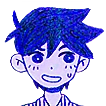
I swear this is an actually interesting question
It might seem silly to ask this, considering the game actually tells us how old he is in Headspace, but stick with me.

Based on this line, Hero (and presumably Mari) are 15 pre-canon, while the rest of the group turns 12 during the year of the album (except Kel, who would've turned 12 prior to Basil getting the album).
So let's take the time skip into account. When we first meet real world Aubrey, she says this:

After this point, the game tends to stick to the time skip being four years whenever it comes up. But this isn't technically true! Even accounting for the months after the incident that Sunny continued going outside for, the incident happened in October, while Sunny comes out again during the summer. Most likely, we're actually looking at around 3 and a half years, with Sunny coming back outside the summer that he would turn 16. Since we are presumably at the beginning of the summer, with Hero just now coming home from college, Sunny would actually be 15, at least during the main portion of the game, though once he's in the hospital, it appears some time has passed so that school has now started back up.
Why does this matter? Well, based on this timeline with Hero being 15 in the photo album, he should have turned 19 the January prior to the game's main events, and this is what most people see as canon. However, within the United States, most people, unless they graduate early or late, will leave High School the year they turn 18, meaning most people turn 19 during their first year at college (if they attend).
At first glance, this doesn't seem to be an issue, but we know for a fact that Hero has actually been away at college for two years, due to this interaction:

This is the second summer that Hero has returned from college! He should be 20! Now Hero is a bit of an overachiever, so it is possible that what is actually happening here is that he graduated early, but I doubt that due to what we know about how Hero reacted to Mari's death.

For that first year, even if Hero was technically going to school, he certainly wasn't excelling at it. By the time he gets to the state we see him in-game, he has maybe a year to a year and a half left of schooling. I'm really not sure that I can buy Hero graduating early, regardless of how well he does from that point on.
I also want to acknowledge that the game could simply take place ~4 1/2 years, rather than 3 1/2. There's no reason not to go with this, other than it would mean that the younger four are actually 17 during the game. You are free to believe this instead, but I am going to go into what I actually think is going here next.
We know that the characters got younger during development. We actually have an older version of the photo album, in which instead of saying that Sunny was turning 12, it says 13. Why did this happen?
Let's take a look at Aubrey's recollection of what happened following Mari's death:
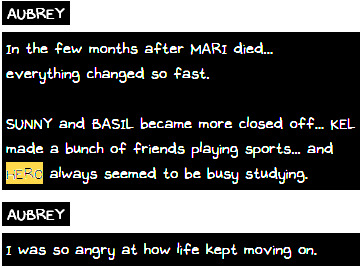
For reference, this is part of what she says at the tree stump during One Day Left.
Her words here imply that she wasn't actually aware about how bad it was for Hero, and most of the fandom typically just leaves it at that.
But that's weird, right? Look at what she says. It seems like she did HAVE a reason for why Hero wasn't available, it was just incorrect. And what's more, this is definitely how Hero would've been after his year of very much not studying. There's no reason that Aubrey would believe that Hero reacted to Mari's death in this way unless it was true, especially since it is something that would later be true.
I also want to point out that Kel's talk in the cemetery in which he tells us how Hero reacted to Mari's death is entirely optional and disconnected from the actual main story cutscenes in the real world.
To bring this full circle, I also want to point out a mechanic that was added to the game VERY late in development:
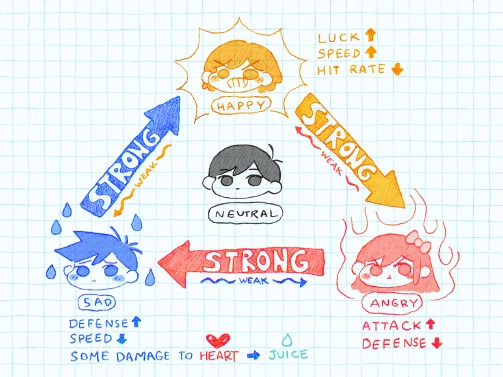
You might see where I'm going with this.
Here's my theory. Originally, Hero would not have reacted to Mari's death with staying in bed for a year in a depressed state. Instead, he would've immediately become lost in his studies as a coping mechanism. However, when the team had the idea for the emotions chart, they likely realized that while happy and angry fit Kel and Aubrey's coping methods respectively quite well, Hero did not seem to fit sadness all that well at all.
In order to make Hero fit sadness, they change his story so that he stayed in a depressed state for a year, but they don't remove his original story of getting lost in his schoolwork. After all, they already had the writing and art assets finished and the game had already been in development for a long time. So instead of doing any major rewrites of the actual script, they simply add a single cutscene in the graveyard that doesn't seem to contradict anything that lets us know that this is how Hero reacted!
Then they had another problem. If Hero spent a year not caring about school, how would he have graduated on time? It would've been difficult even for an overachiever to do two years of schooling in one year. This is an easy fix as well! All you have to do is go through the very few instances of characters' ages being mentioned, and make everyone a year younger! It would've been a lot easier for Hero to catch up and excel if he had an additional year to do so after the incident with Kel! It also gives us another instance of a character getting overwhelmed and angry and pushing someone they care about, which we see multiple times! It works really well, and I like it a lot, but I haven't been able to unsee this change being made ever since the first time I thought of it. The minor line of dialogue about the hero sandwich that reveals Hero has been in college for two years would have been overlooked, since it doesn't mention his age, and likely would've been forgotten due to its unimportance. Aubrey's line, while wrong, can also still be explained away by her simply not being in the know about how Hero really reacted to Mari's death.
I'm not saying this is definitely what happened, but this theory does explain that one tiny little inconsistency that we see in the game. Could also be nothing though idk I'm not perfect
SO
The timeline of the creation of Headspace, White Space, and Black Space! The thing you actually asked about and care about!
It's a little difficult to actually place a lot of things here. Headspace is already so vague. We can use Daddy Longlegs' explanation as a general guide, but it's still difficult to figure out how it lines up with the between night cutscenes, as well as some of the other things.
What I can say is that Omocat has explained Sunny's dream worlds as a very real reaction to trauma that some people have. From this perspective, it would've always existed in some form.
In regards to the truth album line about sinking into the empty room, it's important to keep in mind that nothing there (unless I am super mistaken) implies that this is the first time that Sunny has been there, only that it is happening in that moment. In fact, I find the use of the term "sink" to be very interesting in this context, because very recently prior to the end of the photo album and the incident itself, Sunny had another very traumatic experience when he nearly drowned at the lake. This incident is also very important because many of the traumas that we see from Sunny in game come from this incident. He is still extremely scared of heights, spiders, and drowning by the time the game happens. I don't think it is out of the realm of possibility that White Space was initially created as a response to that, assuming that it didn't already exist for Sunny's entire life.
Next! Headspace, as I understand it, refers specifically to the dream world that Sunny created by merging a bunch of different dream worlds together in order to hide away Black Space, as told by Daddy Longlegs. What we see in the school day memory isn't Sunny exploring Headspace, rather it is just establishing that Sunny has always had a creative and wandering mind, which is why he was able to create Headspace as a coping method in the first place.
The "you've been living here for as long as you can remember" line can also mean many things! It can refer to Omori, as you said, or it could refer to Sunny always having White Space to some extent, OR (and I find this to be the most likely answer) that regardless of how long Sunny has actually had White Space, his repression of ALL his memories both the good and the bad mean that this is literally all he can remember!
All of this is to say: I don't really know. I'm really sorry about that, I've typed this up multiple times trying to come up with a satisfying timeline that I can actually point at evidence for. I believe that Sunny probably had access to White Space before the incident itself, but Headspace probably only became necessary to form out of his different dreamworlds and fantasies after the incident. He was always creative, so he always had creative dreams, but Headspace itself was almost assuredly a post-incident creation.
I apologize that this probably wasn't the answer you were looking for. There might be an answer in there somewhere, but I hope I've shown here how trying to come up with a definitive timeline for Omori can create issues.
#hope you enjoyed the nearly irrelevant theory about how old hero is though#thank you rae zipsunz for helping me come up with this hero theory in a conversation a WHILE ago#omori#omori sunny#omori analysis#omori theory#omori hero#omori aubrey#omori development#omori timeline#its been a while since ive made a long post like this lol#stay tuned for my analysis of omoris prologue and how it foreshadows the rest of the game
43 notes
·
View notes
Text
Hey ISAT fans. You ever think about how, despite the fact that stars and constellations do exist, craftology exists as an in-universe replacement for astrology? Like it's written off as a joke bc you find out about it in act two but like. Stars are so thoroughly wiped out that the lack of an astrological system is something that we take for granted as an in-universe joke, in spite of the fact that they are vitally important to the game and in the title????
Yeah cause I'm thinking about that right now.
#decided to pay closer attention to 'in tears and time' and 'in blood and stars' from the prologue and I've been having so many thoughts#in stars and time#isat#if anyone is interested in genuine analysis posts i would absolutely be down to do that. but i don't want to write a ton of stuff#and just throw it out there to sit quietly#unread#but i have had a whole bunch of thoughts about in blood and stars and if ppl are interested I will totally write them down here#flippin flops
60 notes
·
View notes
Text
MDZS – Prologue thoughts + analysis
"Great news, Wei Wuxian has died!"
(In was, in fact, not great news)
Jokes aside though, what a great way to start your novel – it immediately intrigues you, especially since you likely know WWX is the main character from the blurb at least*. It also introduces one of the main themes of the novel right off the bat, ie scapegoating and mob mentality – not a word is wasted. And I love how it clearly lays out all the things that will be explored/contextualised/proven false in later chapters. In order:
Jiang clan 'adopting' and teaching WWX (proven false/contextualised) – they did take him in and teach him, but it wasn't a full adoption, he wasn't of equal status. Though it is true that he'd be living on the streets otherwise. Part of the reason rumours are so hard to distrust is because there's a grain of truth in them. Also, it's cool how apart from his death, this is the first thing we hear, and the first flashback also takes place in this period!
WWX defecting (contextualised) and leading to the Jiang Clan's near-extermination (proven false i'd argue, at the very least heavily contextualised). It's interesting that they seem to asociate the fall of Lotus Pier, which happened a few years before, with WWX's ('evil') actions now, though it does make sense – but also I wonder how did people came to that conclusion? Did they just make associations themselves (WWX is evil –> WWX was taken in by the Jiangs –> Lotus Pier was destroyed a few years ago –> WWX was there –> WWX caused it)? Did JC mention it to people deliberately, since we know he blames WWX for it? Did people hear JC mentioning it more privately (expressing anger, he does not hold it in) and spread the rumour themselves?
WWX's 'demonic' (ghost) cultivation being the reason for him turning evil and his eventual downfall (proven false, there are some great metas on how guidao isn't actually corrupting. See: how WWX keeps using it in his second life and is completely unaffected, and how in his first life he was suffering from way more stress and a lot of trauma – especially SunShot era – which could easily have explained the seeming change in behaviour during that time. Same for Qiongqi Path and Nightless City)
WWX massacring 3000-or-5000 people at Nightless City (heavily contextualised, reasoned with a little during the Second Siege. I have more to say on this but we'll get to it in time).
And then various other things, eg emphasis on how necessary it is to cultivate the righteous path or else – despite the discovered irony of 'righteous' cultivators besieging and killing 50 innocent people, while the 'demonic' cultivator is the only one protecting them – along more information about WWX's death (most of which is confirmed by passing words/thoughts of WWX) and the destruction of the Yin Tiger Tally.
But the things listed above are said first, which is quite important. MDZS is very much a mystery story, both for WWX, LWJ and often the Juniors uncovering the clues about the missing body parts – but also for us readers, as we find and piece together the missing knowledge and context WWX's past, and the full story hidden behind it. And it's so cool how MXTX lays out what we'll explore (our leads, if you will) so clearly, within the first moments of the first chapter of the book.
(If you want to go there, just like how WWX found his first lead/motivation to investigate within the first few (relative) moments of being brought back to life, with the hand at Mo Manor, but I might be reaching a little too far... anyway parallels in MDZS narrative structure I love you so much)
Other details in this chapter:
I love how this comparison is used:

Having read the book, we know there was a very recent war, so this speed/comparison would be very familiar to everyone! A subtle way of setting up and showing the efforts of the Sunshot Campaign, though you wouldn't recognise it the first time round.
Admittedly we don't know how subjective/exaggerated this POV is, but there is evidence for the fact that hundreds of smaller clans participated (or at least wanted to participate before Nightless City..?), judging by the fact that three thousand cultivators gathered to plan to kill him. Surely that's not just the Great Sects. But on the topic of that, yup, all four sects were involved (I don't think it's disproven later, and all four sects did gather at Nightless City as well**), there's no one 'good one' that wasn't corrupted or complicit.

Even by just reading what the crowd says, it's cool how you can tell that at least some of what's being said is untrustworthy:***

Already, they're contradicting information and exaggerating rumours – also note that later on at the Guanyin Temple (Hatred 2), LXC, someone I trust more, says three thousand when talking about the number of cultivators at Nightless City (even not considering what WWX said during the Second Siege). That contradiction and exaggeration does make you doubt what they're saying a little already! As well as the fact you know there's more to the story due to, again, WWX being the main character.
This is heightened by everyone saying, later, that if WWX returned, 'the cultivation world, or even all of mortal land, would be faced with the most insane damnation and revenge, sinking into nothing but chaos and despair' – something immediately disproven in the beginning of the next chapter, immediately suggesting that a lot of these rumours are much more untrustworthy than they seem.
His death here is made even worse by the belief that (iirc) the state of your body after death affects the reincarnation of your soul...? That definitely contributes to the 'karma' the people mention in screenshot after.

This hurts already, but hurts even more after knowing WWX's fear of dogs due to them always biting him when searching for food...

--
*I wouldn't be surprised if this opening plays a big role in why why MDZS seems to have the biggest following of all MXTX's books. Openings are probably the most important part of the novel, since you start with no attachments that would make you keep reading, and MDZS absolutely nails it. I love it so much!
**Off-topic, but I do wonder how painful being at the meeting at Nightless City (before WWX showed up) was for LWJ...
***I'm curious about this extract, actually – the 7S translations has an extra line/distributes this differently? If anyone knows the original Chinese, I'd love to know which one is more accurate.

#skye rereads mdzs#mdzs prologue#guess who spend two minutes reading the chapter and fourty minutes writing about it.... heh#i probably won't go into as much detail on future ones since it'll take me so so long to finish#but it's *such* a good book/story...#mdzs meta#tagging because it's long and analysis-heavy#my meta
38 notes
·
View notes
Text
Reread the AGOT Prologue last night, and I was so caught up this time in how the dynamics of that chapter are a microcosm of the class dynamics in Westeros.
Not such a long post, but putting it after the cut for ease.
Waymar Royce, of course, stands in for the Lords, with his wealth and name and undeserved authority, while one-named Gared and Will are the smallfolk.
In this chapter, with a speaking cast of 3, there's already this question of where does power lie? In this scene, the smallfolk outnumber the lords 2-to-1, and neither believe in Waymar, but ultimately each of them defers to the lord's authority (the ratio is much more extreme in Westeros at large, but this works for a 3-person dynamic). Will and Gared also trust each other, and trust each other's expertise, more than either of them think Waymar should be trusted in any capacity—he's not leader by merit (he has much less experience than either of them), he's not leader by popular appeal (they laugh at him in their cups), and he's not leader by age (younger than the both).
And we see already in this small moment the ways in which authority attempts to deal with usurpation—which we will see played out over and over again throughout the entirety of ASOIAF.
Gared challenges Waymar's authority on the basis of experience, which is a justified complaint. Faced with an inarguable position, Waymar responds with unnecessary cruelty: "you ought to dress more warmly, Gared." This is one way for the upper class to keep the smallfolk in line—to flaunt their wealth and advantage, and to push back visciously against challenges. This is the Tywin technique, one which we see done consistently throughout the series.
The significance of this being a mental confrontation cannot be overstated: when confronted with Varys' riddle, Tyrion later observes that the rule "All depends on the man with the sword." Here, Gared is the man with the sword—he's a man-at-arms, and the better swordsman. While "Will doubted it[Royce's sword] had ever been swung in anger," "Will would not have given an iron bob for the lordling's life if Gared pulled it[his own sword] from its scabbard." Gared could fully kill Royce here, if he dared. And so the challenge, for Waymar, is to make sure Gared never dares. Power lies where men believe it lies, so Waymar's job as authority figure is to demoralize Gared, so he does not outright challenge Waymar's authority. (This is the role of public humiliation—another 'Tywin tactic,' but which is also used broadly).
Perhaps Gared would dare to challenge Waymar's authority if he were not alone. When Varys follows Tyrion's thinking that the man holding the sword might have some real power, he questions: why do the men with swords obey kings at all, then? Tyrion posits: "Because these child kings and drunken oafs can call other strong men, with other swords." So perhaps the issue is unity, a majority feeling—one man cannot rebel, lest his own class turn against him, but perhaps many can. We see this as the series goes on in instances like with the Sparrows, who amass enough numbers that they can imprison the queen, or with the sellswords in Meereen, who might turn the tide of battle if they switch sides (to the side that they believe might win).
To gain this advantage, Gared and Will would have to be a united front. In the beginning of this chapter, Will was a neutral figure, he's not willing to actually challenge that authority, he didn't want to be involved in the confrontation, but knew "he known "they would drag him into the quarrel sooner or later." Later, though, after witnessing Gared's demoralization, Will nearly steps in himself—in defense of Gared, out of respect for Gared's experience, and in a moment of class solidarity, Will speaks up to defend Gared, and is cut off:
"If Gared said it was the cold …" Will began.
"Have you drawn any watches this past week, Will?"
Here, Waymar's goal, as ruling class of this interaction, is to prevent class solidarity within the smallfolk. If Waymar responded too rudely, or with too much aggression, this might bind Gared and Will together for certain, and Waymar might be usurped (this is the result of the repeated aggressions of Aerys II, resulting in his death, or the repeated aggressions of Tywin which spawned the aforementioned Sparrows).
So Waymar has to employ a different strategy: (still a bit snidely) Waymar plays the role of 'encouraging mentor,' invoking this idea that he deserves to rule by the merit of being inherently 'wiser' or a keeper of 'knowledge'. He suggests that Will figure out for himself, under Waymar's guidance, that the cold could not possibly have killed the wildlings. Led more gently by Waymar, Will seems to decide for himself that Waymar is correct. In short, Waymar is able to reposition Will to be on his side, not Gared's, by leveraging his initial assumed authority and the existing attitude of elite education, even as that makes Will go against his own first-hand experience.
This is another tactic that we see repeatedly used throughout ASOIAF (and the world)—the ruling class acting as though they are simply elevating the ("innocently wrong") subjugated class to a more aware and knowledgeable position. If we believe the Maester conspiracy, they are the most obvious example of this, but the fact that it is only the lords who have access to Maesters means this is implicitly true without even needing a conspiracy—the ruling class is already gatekeeping knowledge and education from the subjugated class. (As an aside: the Maester conspiracy, ironically, is only concerned with the possibility of an even higher authority secretly gatekeeping knowledge from the nobility—in other words, the fear that the Maesters are treating the Lords the way that the Lords treat the smallfolk).
So let's return to Varys' final proposed answers to his own riddle: "Some say knowledge is power. Some tell us that all power comes from the gods. Others say it derives from law." Waymar has employed the knowledge-as-power against Will, and we're also constantly up against the backdrop of law-as-power: The Night's Watch.
Waymar references "Mormont," someone who Waymar does not want to disappoint, and they all consider the agreed-upon terms of the Night's Watch. Even in this microcosmic scenario, they are part of a system, one where this authority figure is, seemingly, held to his own authority figure, and one where the "rules" of the interaction have been determined long before now. In the end, once Waymar decides, "the order had been given, and honor bound them to obey." They have all agreed to a set of laws, already, which keep them bound to Waymar's authority.
So, ultimately, it is in this moment that despite Gared and Will being fully correct in their fears, despite being more experienced, wiser, older, and in all ways better rangers than Waymar, authority itself held true, and Waymar marched them all on towards his own death.
#jozor thoughts#asoiaf meta#valyrianscrolls#AGOT Prologue#asoiaf analysis#asoiaf#night's watch#jozor reread
35 notes
·
View notes
Text
Objection! Yet Another "In Defense"
Okay! My alarm bells went off and it has come to my attention that yet another user has posted a "Jotaro is a misogynist" allegation post. Since Yoongi ain't raise a weak bitch, I am here to give my own counterarguments to the post in more comprehensive detail.
This will be my "Should pineapple be on pizza or die" / "Is mint chocolate actually good or is it the spawn of Satan" type of debate.
I am going to die on this hill that while he is in fact a man of many, many flaws, misogyny is not one of them no matter how convinced some people think he is. I will live up to my bio and that's the truth.
But before I begin, I'm going to put up a couple disclaimers because if I know the Internet, people love jumping the gun almost immediately when encountering someone who has a different opinion than theirs.
Disclaimer #1: Whatever I state (or even what OP has said), is all within the realm of HEADCANON because we aren't Araki. We did not make the canon universe, so all my yapping will be assumptions based on the material presented to the audience. Disclaimer #2: I am in no way shape or form fighting OP, alright? These are just my rebuttals against the arguments she has mentioned. She's entitled to her own opinion. I'm entitled to mine. 'Tis but a food for thought of mine. Spicy edition. Disclaimer #3: I don't want anyone commenting/reblogging this saying "lmao don't you have anything better to do than to argue with people online?" Because I just finished a whole day's worth of examinations, for which I studied a whole week, and got good scores from it. I can do whatever the hell I want during my resting period, anonymous user. Even if it's making this huge ass post defending my hyperfix. Thanks.
With that out of the way, let's get on with the meat of it all.
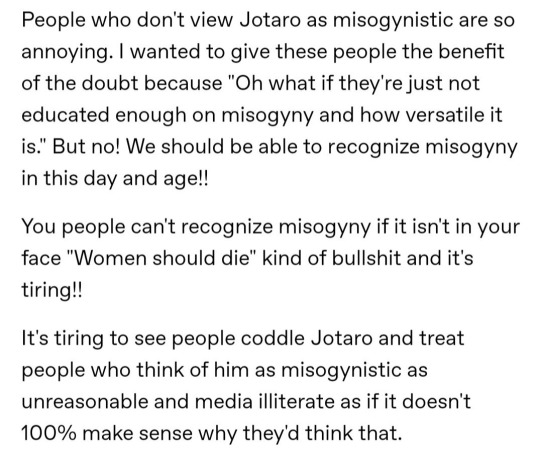
"You people can't recognize misogyny if it isn't in your face "Women should die" kind of bullshit."
Oh I'm aware. Bold of you to assume that we don't know how deep and how silent misogyny can run in today's society. More so in Asia and the Middle East.
And it's slightly insulting to assume that because I want to defend a fictional character and that he isn't misogynistic popularized via memes, you say that "Oh! You don't know misogyny at all! It's annoying!"
You say that because I know in the West, misogyny is the more "in your face" and obnoxious type. But as an Asian woman, I very much know the levels of audacity men can harbor against women that aren't just limited to, as you quote, "Women should die" behavior.
Misogyny is similar to a spectrum. It can be as obvious and proud as the Andrew Tate's, the "Alpha" men, and the basement-dwelling incels. It can also be as quiet and condescending as a regular guy in your day-to-day. They won't preach toxic masculinity, but would instead infantilize, belittle, differentiate, or alienate women and see them as someone inferior to the male sex.
I can sense red flags. I'm hypervigilant about how men behave around women and whether they see them in a different, negative light. So I know what the hell this word means.
And I'm not saying OP is one (I genuinely don't), but women can be misogynists too. Ironic, I know but they exist. Some women are drawn to misogynistic men as well. Booktok is an example of that.
Phew. With that introduction out of the way, let me first make my little assumption on why this whole debacle started before I start breaking down each argument.
When you look at it from a bigger picture, he doesn't get to interact with many women in this series with an abundance of male characters. So it's easy to jump to conclusions about their stance on it when you decide to base a whole character on the beginning episodes.
I think the reason why some people are convinced that Jotaro is an "anti-woman" is because he yells at women... for the first few episodes. Let me see what else. *Flips note* Oh, that's primarily the reason. Okay.
What bad things had he done? Called Holly a bitch and yelled screaming girls to shut up. That's it. Any other things I left out was intentional because I will be discussing that separately.
I won't expand on the whole "but Part 3 happened because he loves his mother" shtick because it's in the first argument. But when you come to think of it, he doesn't really say "bitch" as much as people expected him to outside of Holly. He doesn't even say it unwarranted or like he wants to.
Onto the screaming flock of school girls. Before he tells them to shut up, here's what happened. They congregate, start calling for his attention, and one of them grabs his arm.
What does he do? Does he yank his arm off in disgust? Does he shove her even slightly? Does he tell her to "back off bitch" or "get the hell away from him?" No.
He simply looks at her and does nothing. Ignoring her so to speak. Because he doesn't like the attention of being seen as a piece of meat for them to ogle at. He only tells them to shut up when they start becoming obnoxiously loud.
"But he was very rude and pushed those two women on the plane!"
Ma'am/sir, they're on a plane about to crash unceremoniously into the ocean, and the flight attendants decide to prioritize fawning a minor over their own lives. In the process, they block his path to the cockpit. Who wouldn't get frustrated in a situation like that?
Onto the arguments:
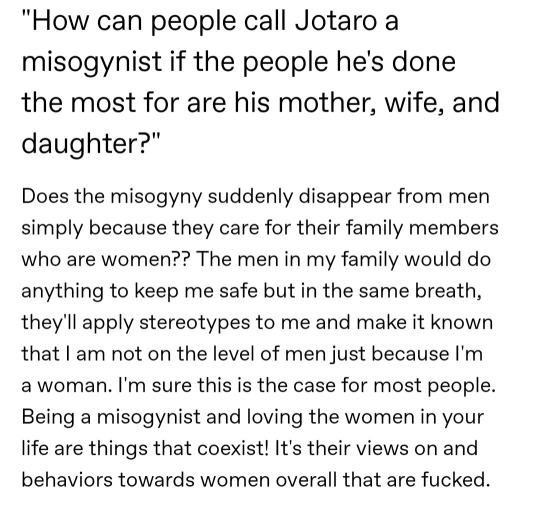
I agree that there are misogynistic men who can still love their female family members but still be an "anti-woman" towards others. But I can cite examples on how he interacts with women who aren't family in contrast to how a misogynist would.
Case A: The School Nurse
And we have one of our first earlier examples from Episode 2. When we first meet her, he's sitting in the infirmary and she's there almost giving him a light lecture about getting into trouble. He wants his knee patched up and she's about to do that because that's her profession.
How does he behave around her? Does he show body language signs indicating he's undermining her skills as a nurse? Does he call her a nagging bitch for lecturing him? Does he dismiss her words?
No. He evades her hands from reaching his hat, and when she's about to snip his expensive pants he reasonably asks "what are you doing?" She explains her intention and he sighs, simply saying that he'll take them off himself.
Does he show resistance? No. He does what is told so his knee can be treated.
AND after Kakyoin reveals himself, he gets pissed at him for using the nurse as a puppet, saying his whole speech and ending it with "Especially if it's an innocent woman!"
I've seen some use this sentence as him being misogynistic because they perceive it as a sign of belittlement when in actuality, it's not.
You have to know that he lives in 80s Japan- Patriarchal Japan where women are most likely going to be treated less than men in general even up to today's day and age. (I doubt you've heard but there's currently active crimes against women in Korea. If shit can happen there today, it can happen in Japan too). Let's face it and I hate to say it but it's the truth: Women are part of the minority. That's a reason why gender equality rights are being fought for, and why feminists exist to begin with, as well as the creation of the MeToo movement.
Jotaro knows women are more prone to be taken advantage of in this country, more so during this period. And he hates that. He despises that. Hence why he responded with such words to Kakyoin with that much vitriol.
He acknowledges he's not a perfect guy, that he's a punk true and through, but he has enough dignity and moral values to see that when one portrays women as lesser than men and uses them for personal gain, it's vile and evil.
Case B: Anne
Miss little stowaway! Let's see his behavior around her. OP has mentioned her at the ending, being on the fence and all, so I'm here to shed some light.
Back in the boat when she's still posing as a boy, how does Jotaro see the situation: It's a child in the middle of trouble. He looks at it not through the lens of "I applaud this boy for fending himself", but more so through "People are already intervening so I'm gonna sit this one out."
She goes overboard and he jumps in to save her. And then he finds out Anne's a girl. Does he think differently of her? No. She's still a child who needs saving.
He becomes her passive big brother figure. He wants to assist her off the small boat, but she declines and sticks a tongue out, and he sighs. Saw someone's head get mutilated? He shields her eyes. Anne is getting inappropriate attention from an ape? He intervenes and sees the orangutan as a disgusting animal, both in a literal and figurative sense. Falling off a cliff? He safeguards her. Caught in a dead end? He helps her with a quick "good grief".
Case C. Tomoko
Another example! But let's switch it up a bit to Part 4 this time. A testament on how his personality was really just him being a teenager going through an identity phase, replacing that punk persona for professional stoicism.
When he visits her house to look for Josuke, he meets her. She sees him, thought he's Joseph, and immediately goes in for a hug, motorboating his chest with a string of "Love you's" spilling out in that pitchy voice.
Does he call her a bitch? Does he pull her away because she violated his boundaries? Does he make some belittling comment about her behavior in his mind?
No. Jotaro stands put, gets put off because she's all up on him rubbing her face on his chest, tells her frankly to look over him again and says he's not Joseph.
And then he asks if Josuke's at home. Tomoko's zoning out. And what does he do? He doesn't groan. He doesn't roll his eye at her blanking out. Instead, he notices she isn't responding so he repeats his question to her face with the same polite tone so he can snap her out of her thoughts.
And when he leaves, he says one more thing to her. It's easy for anyone to say something along the lines of "Toughen up, it'll get better" / "It'll pass" / "Hang in there". But what does he say instead? He offers condolences and mentions that if Joseph was less senile, he'd support Tomoko, knowing that she's been wanting to meet the old man again.
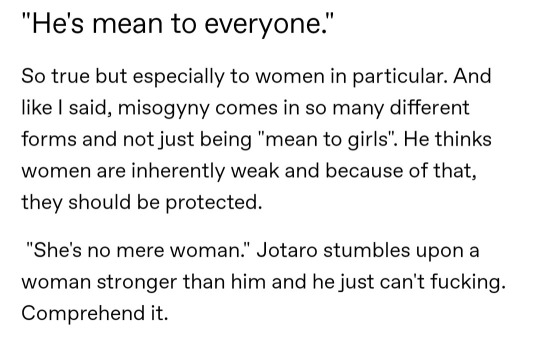
Yes. That's because he is mean to everyone. Equally. Hell, I think he calls men "bastards" more often than he calls women "bitches". In which part of the show did he show any sort of condescending remark that women were weaker? How often does he spout out "bitch" in the entirety of the show?
He protects them because, for one, his enemies have supernatural abilities that ordinary civilians can't see. Which one will make him more of an ass? Protecting them or turning a blind eye?
It's like saying that a man shouldn't help a woman struggling with her heavy luggage up the staircase because "Hey aren't we all equal? They should struggle as much as we do!" Which is such an asinine concept to adhere to.
It's not seeing them as weak. It's called having basic human courtesy. He's going to help because they're people who need help, not because they're women in need of saving.
How is that any different from him wanting to protect Koichi? From him wanting to protect Josuke?
"She's no mere woman. Jotaro stumbles upon a woman stronger than him and he couldn't comprehend it."
OR.
He knows something's wrong with the nurse so he makes that comment. "She's no mere woman" as in "She's behaving erratically than what a normal person should be behaving." Man or woman. She has a welcoming personality so of course he'd be thrown off guard when suddenly she's stabbing students in the eye and cheeks with unnatural strength.
And the way you worded this was as if you're saying Jotaro is allergic to strong women. When it wasn't the case at all. In part 3, he fights against strong women Stand users (Enyaba and Midler) just like he does with the male enemies. In part 6, he teams up with strong women Stand users (Jolyne and Hermes).
He even outright states and believes that Jolyne can make it through the chaos because he knows she's strong and capable. He's proud of her strength and abilities.
Again, in which part does he not comprehend that women can be strong? That it's so mind-boggling to the extent you had to include "fucking" to emphasize your point?
In fact, I think he'd respect and appreciate a woman who knows her self-worth and power. Sees a successful female colleague? *applauds in stoic.*
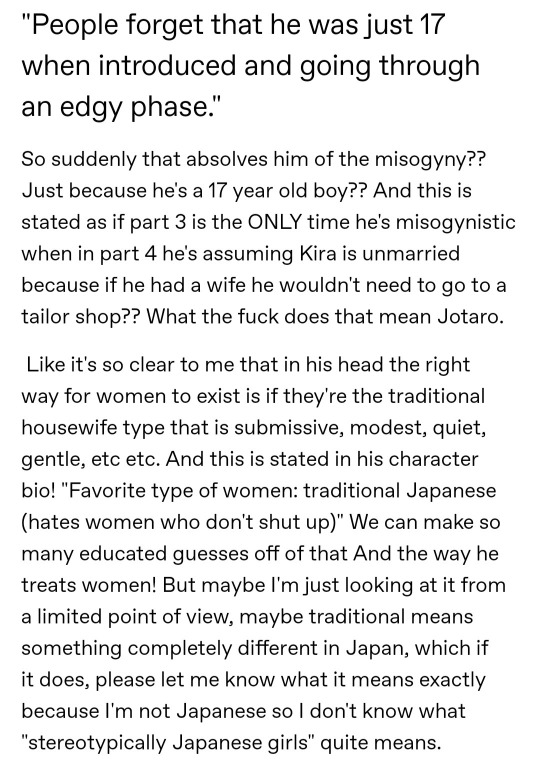
Again, I agree that age does not excuse anyone to be misogynistic. It can happen at any age. Because it's a mindset. It's rooted deep in the psyche. But I've already made my case about teenage Jotaro so I'm not gonna reiterate.
With the whole Kira deduction thing in Part 4.
Let me restate this- The time this part was set in is the late 90s. Setting? Japan. A patriarchal country where gender roles were more rigid and inflexible. During that time, I hate to break it to you, but the country was not that expressive nor progressive as compared to the West. It was common for women to be housewives doing the chores and tending to the kids, while men did the heavy labor out of the household.
So you cannot blame Jotaro for making that logical deduction. He was born in Japan, knew by then how his country works at 28 years old, and thus is able to make a deduction based on the patterns of how society was structured during that period.
Sure you could say some women worked too, but the majority of them would be the typical housewife. In 80s-90s Japan I say again.
"Traditional Japanese"
This, fellow readers, is what you call a "Preference". It can be harmless and not necessarily condescending. But even then, with the inclusion of the parenthesis, you could say that this was a choice based on the mindset of a teenager's train of thought.
Jotaro likes his quiet time -> learns from the world that apparently traditional Japanese women are usually the "quiet types" -> resulting in the aforementioned preference.
And just like any other preference, it can change with time as you grow older and wiser. As you can see, he dates and marries a foreign woman who's not "traditionally Japanese" and even had a kid with her.
It doesn't necessarily mean he wants a housewife who can cook and clean for him. At the age of 17, that's the least of his concerns. All he wants is for his partner to know when it's appropriate to be quiet and when it's appropriate to be excited. He prioritizes his peace. As simple as that.
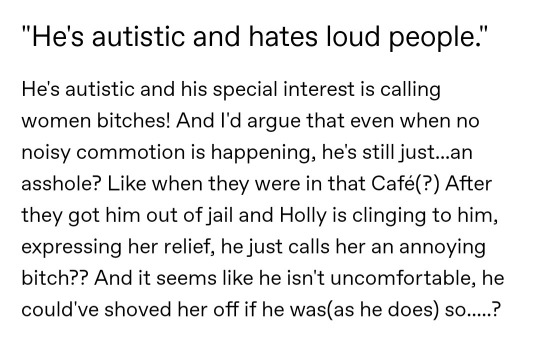
I can see why people like to see him as part of the autism spectrum and I respect that.
And yes, I acknowledge that he's a huge asshole. No denying that. That's just how he is at that age.
And again, we don't see him say "bitch" that much anyways for it to be a verbal stim of sorts. I recall he says it twice or thrice. And that's it.
Personally, I'm not that sold into the headcanon (and this is coming from someone who probably has ADHD and has a sibling diagnosed with autism). Introverts can be callous. Some can look apathetic. Not every one of us will be shy and timid.
"He could've shoved her off."
And you know why he doesn't? Because as much as he tends to bark and yap about how annoying and doting his mother is, he loves Holly. He likes her hugs. He lets her give him goodbye kisses to the point it has become a pattern in his life. He likes her cooking. He's going to travel the whole world for his sick mother to get better.
And Holly knows that. A mother knows her child more than anyone else. She's unfazed by his words because she knows the good son she raised underneath that tough abrasive persona. Heck, even Suzy Q knows that too.
Also a cute little assumption. After they fight Midler and after Suzy talks to Jotaro, you can see his hand lingers on the phone. It's as if he's contemplating. I'd like to think that's a moment where he wanted to call Holly, to check up on his mother.

I agree that being gay doesn't excuse someone from being misogynistic. Like I said, it can happen to anyone of any gender or age.
Gay people can be misogynists. Point blank period.
Personally, he's a demisexual king in my eyes. But others are free to give him any orientation they see fit. Gay, trans, bisexual, aroace- You name it. The fictional world is your oyster! Go ham!
I believe that a fictional character's sexuality is a headcanon in on itself unless explicitly stated by the creator. Telling someone that character is straight? Headcanon. That character is gay? Headcanon. Claims a character to be non-binary? Headcanon.

"He's just a baby boy uwu uwu"
Okay OP with the "we're infantilizing him" allegations! That's new!
(That... was passive-aggressive of me. Apologies. I'm aware we call him "baby girl" often but with the way those two words were put into that sentence combined with the emojis gave off a different connotation.)
I don't know why but whenever we say that Jotaro isn't *insert one negative trait*, y'all are quick to say that we are proclaiming that:
"Oh my god~ He's not like that~ He's Saint Peter coming from the heavens pure as light."
Like what? No seriously... what??? I have never seen anyone treat him like he's the perfect human being.
Hell, I can even say that he's NEGLECTFUL. Yes! He's a neglectful father no matter how good his intentions were. He was an absent parent who technically neglected his child. There! I said it!
We KNOW he's an asshole. We KNOW he has a multitude of flaws that are not admirable. He's reclusive as fuck. He's brash and abrasive. He's seemingly distant when he talks to people. Socially awkward outside of work. He's impulsive when he wants to be.
I love character flaws. That's what makes a character so fascinating.
So please, if you have any strong opinions, keep them to yourself. Not everything has to be shared online. Thanks for coming to my TED talk.
I can see a shit ton of flaws in this reserved, stoic mountain of a man. But I draw the line when it comes to some traits that seem not entirely fitting of his character.
The ending paragraph...

Me, an Asian woman constantly facing the audacity of men my age objectifying women and promoting toxic masculinity on a daily basis:
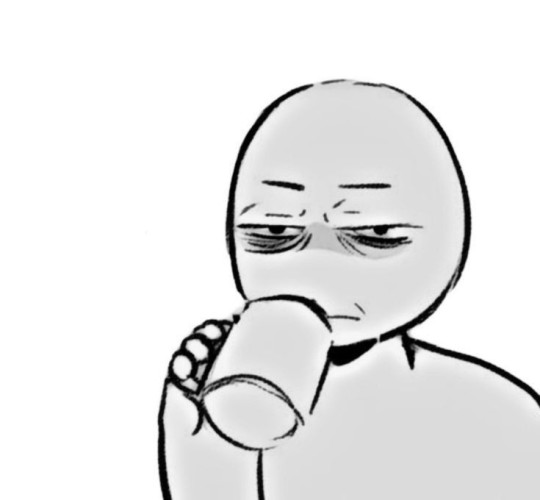
#jojos bizarre adventure#jjba#jotaro kujo#mijin ramblings#I still have that psyche analysis that's coming soon so I guess this post can be somewhat of a little prologue whew#me when I'm old and my tendency to hyperfix is still as strong as ever skssksksk
14 notes
·
View notes
Text
The Wrath of Darth Maul by Ryder Windham. Notes & Quotes.
Prologue.
*This is something I have been thinking of doing for a while. I'm a weirdo who likes deep reading texts and mining them for meaning. I have been doing it for this text for some time. I thought I might share it, but more importantly, create a catalogue for myself of notes. I don't know how this will be received, if it will be at all.
This catalogue will present interesting quotes, running themes, headcanons, and an exploration of Maul's experiences. Feel free to browse or use at your leisure. Spoilers ahead.
[scene: spidermaul in the tunnels].
"The prong-nosed rat knew that the dark heap lying in the tunnel was a dead man." (Windham, 1).
This is the first quote of the text. First quotes often hold thematic weight, and frame the story that is to come. It is interesting that Maul is described as a "heap" -- an object, not a body, and that he is specifically described as "dead." This narration establishes that 1) he is worthless, and 2) he is doomed. Fitting for his character, I think. Obligatory world-building: he ate rats to survive, scavenged waterproof fabrics to sleep under, and was an ambush predator who played dead to lure in prey.
"The legs were unevenly jointed, cannibalized from the parts of ruined droids, each leg ending with a tapered point." (2).
Cannibalism mention :3. Interesting that what is cannibalised is a droid, a being in star wars that is not even considered alive. For Maul to cannibalise a droid, on some level, he must thematically be considered a droid. Obligatory world-building: Maul doesn't remember how he got there, how he got his legs, where he is or who he is. He lives as an animal, but with one thing added: "pure and total hatred" (2). Note: unlike The Clone Wars, Maul does not speak and rave. In this depiction, he is silent, as he was in The Phantom Menace.
"He knew that he wasn't a man anymore, that he hadn't been one for years. He was just a creature in a filthy tunnel. And then he remembered the object of his hatred. A man... the man who left me for dead." (3).
Gendered reading: Maul states here that he doesn't consider himself a man anymore. One reading is that, without the bodily aesthetics, obligations and power of conventional masculinity, Maul considers himself worthless (toxic masculinity). Perhaps, he has been drawn towards another gender expression. Maul notably, doesn't even consider himself to be "human." This is a very sad glimpse into Maul's sense of self-esteem. He has also internalised Sidious' vision of an absolute hierarchy of life. Obligatory world-building: Maul has a tantrum when he can't remember things, and destroys his surrounding environment. This does not satisfy him at all. It is interesting to note his coping mechanisms at his lowest point.
"It was then, while he felt his hatred burning within, that a spark ignited in his mind. And he saw a sea of fire..." (4).
A couple of thematic links that I would like to point out: "hatred" and "within" encapsulates Sith philosophy; the inverse of kindness throughout. What begins this journey through his memories is a "spark" - a common phrase I know, but also one intensely linked to Sidious and his primary element of force lightning. Sidious is a catalyst, and the secret at the centre of his being. The oxymoron of "sea" and "fire." This is his literal childhood home, of course. But, later in this novel, Maul's beloved memories of friendship will occur by a sea. I believe it intertwines the characters of both Maul and Kilindi. HC: the previous page ended with Maul remembering a Man to blame... yet this novel begins with the memories of his time in Mustafar under his master. It is of my belief that this unnamed man is Sidious, not Obi-Wan Kenobi.
26 notes
·
View notes
Text


VERSE INFO: FINAL FANTASY XIV x JUJUTSU KAISEN XOVER: PROLOGUE
☉一AZEM, THE FOURTEENTH SEAT.

❍一Getou would come to learn his soul's origin within Azem's journey. The revelations would come with more relief in understand than anything else: the reason why he felt somehow responsible for the condition of the world, why he felt it was his purpose to guide the future towards a higher-minded path, the grief and restless turmoil he experienced in the presence of the attenuated masses, the reason why he felt so driven to reach the pinnacle of his abilities, the need for family coupled with the sense that something was missing, no matter who was nearby, and the instantaneous connection he felt towards Gojo Satoru, upon what should have been their first meeting. All of it could be traced back to his rise and fragmentation as Azem, in the era of the Ancients. Following the events of Shadowbringers, Getou has aligned himself and his purpose tightly with the legacy of The Traveler - the counselor to the people, mediator, wanderer, scholar, eager combatant, and one of many of the star's most stalwart guardians.

Azem, the Fourteenth Seat of the Convocation Featured with his signature mask. The design incorporates the shape of his glyph, among other personalized details. The Glyph of Azem An abstract depiction of an enlightened being wearing a crown of sunlight, appearing to offer succor to a group of figures, united through clasped hands.The design somewhat resembles his familiar's Awakened state.

☉一Zenith was Azem's most treasured companion. A familiar that he adored so much that he imbued it with a fragment of his own soul, so that the familiar could kindle that light and build upon it until it was Zenith's own.
Zenith's development was so prodigious that he inspired a myriad discussions over the nature and rights of familiars - their potential and the assurances they should be provided. Regarded as the Strongest Creation on the Star, he would even come to share the Seat of Azem with his creator, creating a partnership that was unsurpassed in strength, dedication, capability, judgement, and fellowship.In the late hour of the era, at the end of their lives, Azem carved his summoning spell upon the mirror of their souls, to ensure that they would remain within orbit of one another, in life and death.
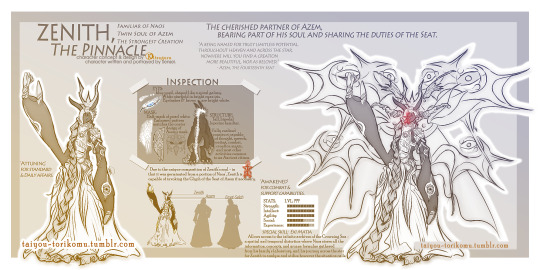
☉一Zenith, in not being a true Ancient, wasn't successfully sundered, and his soul was sent wholly to the Seventh Reflection to be reborn - infrequently, due to the massive demand of aether by what would come to be known as a conjunction between the 'Six Eyes' and 'Limitless', in a sundered shard. Due to their resonance, the bulk of Azem's soul accompanied him.Azem and Zenith were reborn into the people of the seventh shard. They lived, died & were reborn, and their abilities were remembered.
Azem's reincarnation could manipulate energy and summon entities. Zenith’s reincarnation retained spatial and temporal manipulation.
Azem's reincarnation still strove to fill his role to the star, without memory of his Ancient life, or the grace of Etheirys to soften his journey. His drive to improve the lives around him clashed with the morality at his center that judged the cruelty, and lack of self-awareness in the people he desired to see thrive.
Zenith’s reincarnation struggled to balance the impression of being a godlike being to walking a mortal existence. People felt foreign to him, being viewed as a person felt unnecessary, and connecting with others felt unwieldy.
Like all of of the Source’s Reflections, the seventh shard was an incomplete world, and its people were saturated in suffering and loss. This caused certain aspects of their innate abilities to degrade and adapt. Jurei Soujutsu is what became of Azem's ability to import the aether of that which he loved, to replicate or take it to the Crowning Sea - his personal archive within a distortion of time and space. His reincarnations, up to Getou, instead swallowed the effigies of the harm others suffered - the worst experiences of mortal life, condensed into creatures and then into pearls - becoming entities that he could summon later to aid him in battle. His reincarnations were quiet, as his soul and Zenith encircled each other from within one small nation.
Rikugan and Mukagen were the technique names applied to Zenith’s capacity to perceive and manipulate temporal and spatial quotients. His innate abilities were renamed as Six-Eyes and Limitless. They were difficult to manifest in aether so thin, and rare it was that Zenith’s reincarnation could host both abilities at once, with some four hundred years between, and a thousand years between a fully-reincarnated vestige.
Only when their paths crossed, the heirs to Zenith and Azem's soul experience a sense of kinship and completion. But their reunions were always bittersweet, due to the strife and chaos that saturated the Seventh Reflection. Fandaniel's actions, disguised always as the actions of a denizen of the star, preyed upon their fates in an endless cycle. ...until the Seventh Umbral Calamity brought all the pieces back to the Source...

#the fourteenth seat of azem; prologue 一 ffxiv xover.#shoutoku jutsushiki; 生得術式 | innate technique: analysis & headcanon 一 any verse.#mukagenborn
4 notes
·
View notes
Note
Hey Raven, hope your doing well. I was rewatching book 5 and something struck me. Crowly stills does his thing to get yuu/mc to host the NRC tribe at Ramshackle. But compare to previous chapters hes seems a little nicer, i guess? He offering renovations and upgrades ( a positive), instead of just threatening to cut yuu's food budget or something (a negative).
Where im going with this is, do you think Crowley may have felt a tiny tinge for his (in) action in book 4? Or atleast, realized he actually screwed up. He did give Yuu in case of an emergency.... and promptly ignored it (or just turned it off) when he went on break. He likely had to have heard what happened over the break...an likely saw his missed calls and put 2 and 2 together. Sure he may not feel bad enough to apologize (at least openly), but he does seem to make himself scarce early in b5. That could just be him being, well, the headmage. Maybe he's just not sure how to deal with MC or how they'd react to seeing him? So instead of threatening Yuu, he offers them something instead? Idk, maybe im reaching. Crowley relationship with Yuu is complicated. I do like to believe he has some empathy or regret (or maybe he just has more respect for yuu by b5?) After everything up to that point
Like i said, i may be reaching here. Wanted to get your input. Sorry for the long ask. Have a good one :)


In many fandom depictions of Crowley, he often serves as Yuu's guardian who is incompetent but well-meaning. I'm also guilty of doing this, Crowley is considered my OC's father figure (even if my OC isn't a Yuu). That's how we choose to engage with the characters and the world that we love! However, I don't believe that Crowley has that sort of tenderness for Yuu in canon, whether at the start or as their relationship develops over the course of the main story. Now, that's not to say that I think Crowley is cold or hateful towards Yuu. Far from it! He does care for them, but in the same way that a teacher might care about nurturing their students and preparing them for the world beyond graduation. Crowley demonstrates a similar attitude towards other NRC students, with one very clear example being in his Raven Jacket vignettes. In those stories, he likens his students to apple trees that he raises and nurtures, hoping that one day they might bear fruit. He does not particularly grant Yuu special treatment unless it's a scenario where he wants them to do a favor for him. (Though here I would also argue he does the same for other students when he wants them to resolve an issue in his place, which happens frequently in event stories; in Fairy Gala, he warns the boys they'll be held back if classes cannot proceed due to the wacky weather. In Ghost Marriage, Crowley shames the boys for not expressing interest in rescuing Idia, etc.)
I also want to set the record straight regarding how exactly Crowley gets Yuu to comply with his requests. Reviewing all avaliable books in the main story, Crowley rarely outright threatens Yuu if they refuse to help him:
Prologue — Crowley does not initially ask anything of Yuu, but he does provide them a temporary home and food until they can sort something out. During Yuu's stay, they are meant to do handiwork to earn their keep. However, Crowley tries to expel them after their involvement in breaking what is considered a precious chandelier. In this case, his anger is somewhat justified but it's still the one major example of Crowley leveraging something to force Yuu to act in a way that he desires. The thing is, it's revealed in chapter 19 that Crowley did not believe Yuu could acquire the magestone he asked for and was all set to finalize the expulsion papers. So really, he wasn't serious at all in giving Yuu a chance to redeem themselves and was going to expel Yuu anyway (until they happened to prove their "usefulness"). Whether this counts as an example of Crowley "threatening" Yuu, then, is up to individual interpretation.
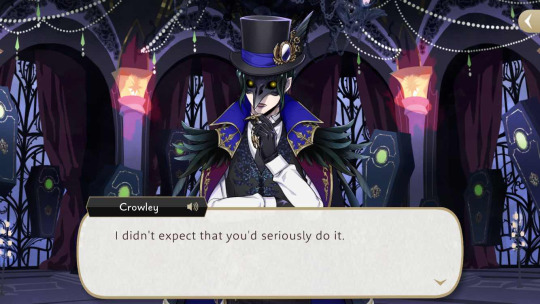
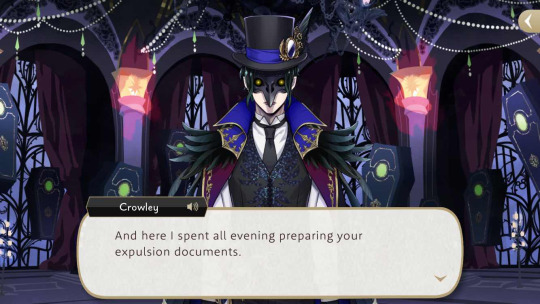
Book 1 — Crowley makes no specific request to Yuu. He shows up late in the book and suggests to the frustrated Adeuce that they fight Riddle to claim his seat as dorm leader, but does not tell Yuu to do anything in this situation. Recall that it was Ace that marched up to Ramshackle's front door and demanded that he be allowed to stay overnight; Crowley had no part in that.
Book 2 — In 2-7, Crowley asks Yuu to investigate the strange string of accidents that has befallen the students set to play in the upcoming inter-dorm magift/spelldrive tournament. There is a part where Crowley says he "never promised to cover living expenses". You, as Yuu, have the option to ask him "Is that a threat...?" to which Crowley never properly responds. Interpret that how you wish. He then offers Grim and Yuu a chance to participate in said tournament if they succeed, seeing as they lacked the 7 players needed to form a team. Crowley even says he will find 5 other players to fill in their missing team seats for them.
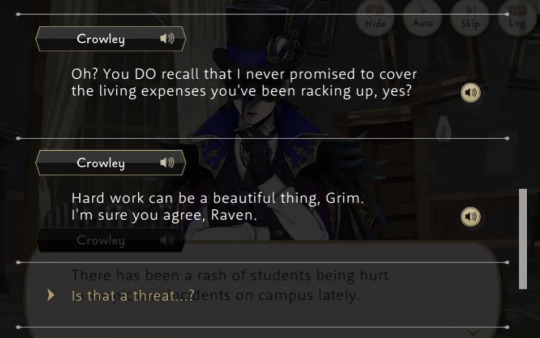
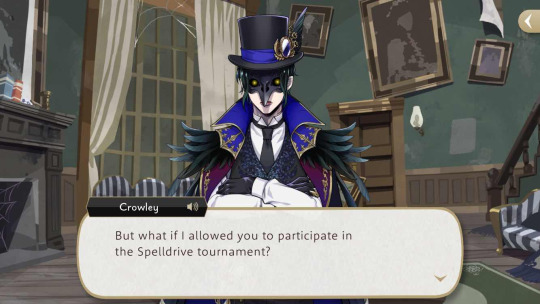
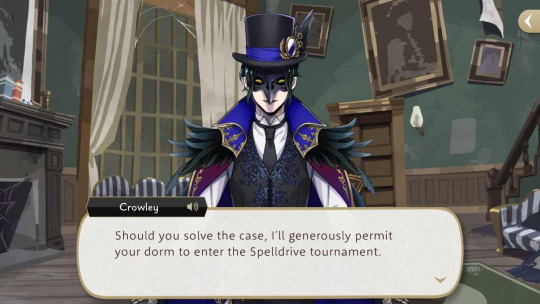
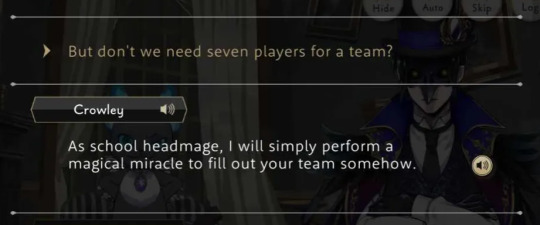
Book 3 — Here in 3-6, Crowley never actually threatens to cut off food. Instead, he is trying to earn pity from Yuu by guilt tripping them and emphasizing that he, the headmaster, is so busy with his tasks (like finding Yuu a way home) and will provide them with the funds they need regardless because he is so very kind. He's trying to tug at their heartstrings by pointing out the things he selflessly does for them, so they feel obligated to do something for him in return. Once Yuu agrees to help, he lavishes them with praise and says it is "expected" of someone he personally chose.
But!! I want to add that in the Episode of Octavinelle manga, this same scene is depicted as Crowley threatening to cut their food budget. I'm not sure if this is just a different interpretation (since Yuuta seems to prepare more food than is usually implied in the game; this would explain why their food costs go up significantly) or if Crowley truly was also threatening to cut the budget in the game.
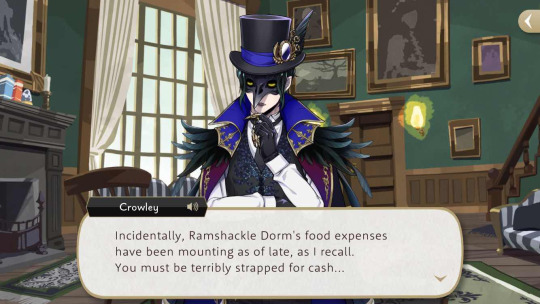
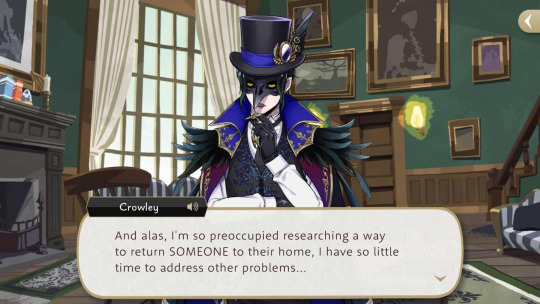
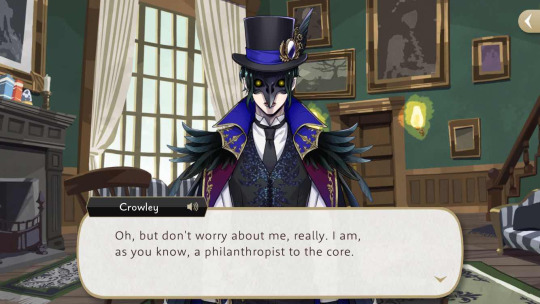
Book 4 — Crowley makes a reasonable request in 4-2; he asks Yuu and Grim to tend to the fire fairies over winter break since it's a task no one else will be present to handle. In exchange, he says he will give them a banquet of tasty foods (which is not an empty promise; in 4-39, the Ramshackle Ghosts tell Yuu and Grim that the headmaster has left them with a ton of food as thanks.
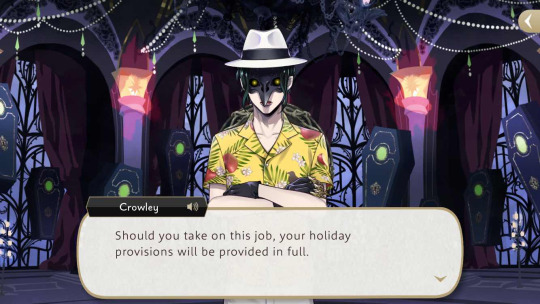
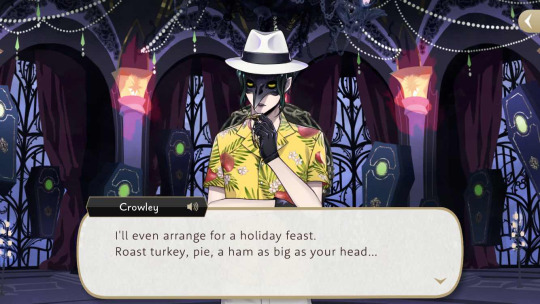
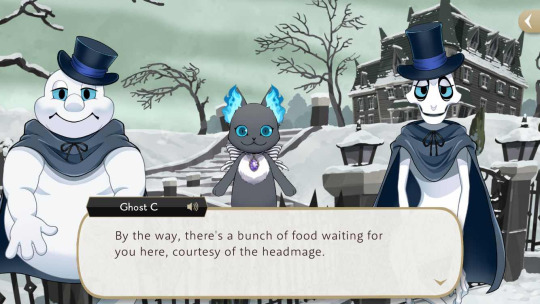
Book 5 — Crowley appears in 5-21 asking that Yuu allow the NRC Tribe to stay at Ramshackle for their month-long training camp. He explains that Vil and Rook are willing to give up their share of the prize money if Yuu agrees to these terms. It is then that Crowley adds that he will help with renovation too, most likely to sweeten the deal with his word.
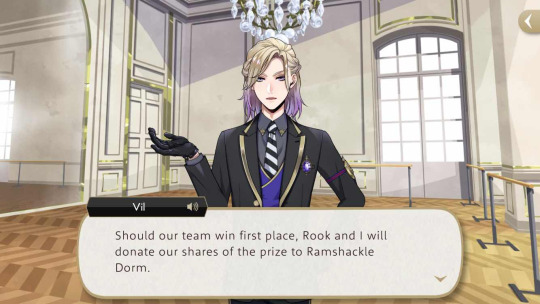
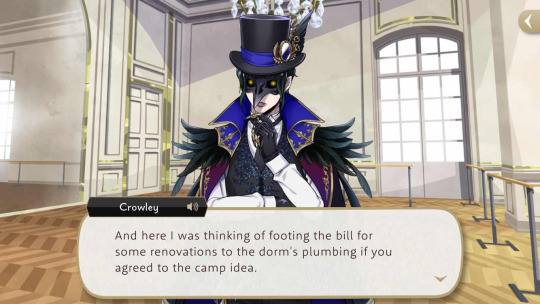
Book 6 — Crowley does not ask anything of Yuu. He does, however, call in STYX in 6-2 because he becomes concerned about the threat that Grim poses after consuming multiple crystallized blots. After Grim is taken, Crowley instructs Yuu in 6-4 to wait until Grim has recovered and been evaluated by a third party to speak with him again.
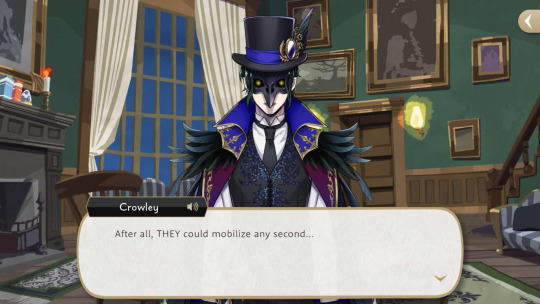
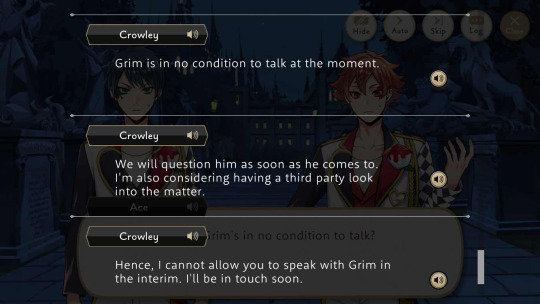
Book 7 — Crowley makes no specific requests to Yuu.
You can see in almost all instances that Crowley uses a variety of tactics to get his students to do what he wants them to. He bribes, shames/guilts them, points out very real consequences if the problem at hand is not resolved, and, yes, occasionally makes what can be interpreted as a vague threat. Despite this, the fact remains that he was always nice, not just post-book 4 (in fact, Crowley was also nice during book 4). I don't see the circumstances as "anything before or during book 4 is him being negative and threatening to punish Yuu and anything after book 4 is him being kind and positive to Yuu". In most cases with Yuu, he is offering them something they would want. His go-to strategy isn't threats, it tends to be the promise of a reward.
I wouldn't tie any of Crowley's actions to feeling a sense of remorse or guilt on his own part. While it's true we don't really get to see inside of his head, from what we see of him... this man is utterly shameless. He's willing to resort to emotional manipulation to convince literal children to solve problems that he, the powerful mage and adult, should be dealing with. What's more, he praises himself for Yuu's competence and willingness to step up. That's him placing a lot of faith in his students, and I don't think he feels any guilt in doing this. Why else would he send them into dangerous situations over and over again? He must, to some extent, believe they can already handle themselves just fine, otherwise he's creating tons of legal liabilities for himself by purposefully throwing children of tons of affluent families into the line of fire. Besides, he's a highly skilled mage himself--if any true, TRUE danger were to befall them, surely he could save the day himself. My thought is that he has sort of a "tough love" approach where he tosses his students into the fires and sees how they get out of it in one piece, but it's just presented in a "devil-may-care" way because of his lackadaisical attitude.
Regarding book 4, I personally see Crowley giving his cell phone number as just a means to provide reassurance to Grim and Yuu, since they (especially Grim) are protesting about him seemingly leaving on vacation. It's an empty gesture so he can have his getaway without much of a fuss; I totally believe that Crowley did not ever intend to answer his phone. When he returns in book 5, he's already asking another favor of Yuu, so I get the sense he isn't really bothered by what happened. I would even say that Crowley still has several major appearances in book 5, not that he has made himself scarcer. He appears to ask the favor, appears again to evaluate their performance, and then a third time at the cultural festival to speak with the headmaster of RSA. Crowley gets plenty of screen time here, much more then in books 6 and 7. If he truly felt bad or actively wanted to avoid Yuu, he could easily just tell other students (ie Vil) or even school staff (ghosts, teachers, etc.) to relay the deal for him.
Again, I want to be clear: THIS IS NOT CROWLEY BASHING. The only thing I am expressing in this post is that while I do love this bird-brained goober and think he cares for his students, I don't believe it's done in the conventional sense you're thinking of. Crowley can be selfish and callous and throw his students into danger, and that's okay! Sometimes we want to love a useless man who's trying his best, even if his best is pretty lousy/j
Whew, that was a lot of brain dumping! I hope I properly responded to all your thoughts and that you found this read semi-entertaining~
#twst#twisted wonderland#Dire Crowley#disney twisted wonderland#disney twst#prologue spoilers#book 1 spoilers#book 2 spoilers#book 3 spoilers#book 4 spoilers#book 5 spoilers#book 6 spoilers#book 7 spoilers#Yuu#notes from the writing raven#question#twst character analysis#twst snalysis#twisted wonderland chatacter analysis#twisted wonderland analysis#twst manga#twisted wonderland manga#Yuuta Mito#Mito Yuuta
147 notes
·
View notes
Text
Little Hope MBTI character analysis
A little while ago, I made this post where I typed all of the DPA characters as their possible MBTI types. I enjoyed thinking about it, so I thought I would go ahead and share my analysis for each of the characters!😊
Starting with the Little Hope characters because @delurkr expressed interest, so thank you!😊 Currently working on the MoM characters, so I will also post those as soon as I'm done❤
Here are my analysis posts for all the games!
All analysis under the cut bc it's kinda long lol
Andrew (INFJ): Andrew was one of the easiest DPA characters for me to type. INFJs are the "Advocate" or the "Counselor." Both INFJs and ENFJs typically fill the role of the group mediator, due to their combination of Introverted Intuition (Ni) and Extroverted Feeling (Fe). For INFJs, Ni is their primary cognitive function, which essentially relates to their desire to figure things out. They find themselves in their own head very often, trying to make sense of various concepts or ideas. We see this with Andrew, as he spends the majority of the game trying to figure out what's going on and how they're connected with their doubles from the past. Fe is INFJ's secondary cognitive function, which relates to the "mediator" or "counselor" aspect of their personality type. Andrew pleads for the other characters to stop their fighting when it's clear to him that the arguing is not helping them figure out what's going on. Finally, INFJs essentially have a "chameleon" personality, which enables them to get along with almost any type of personality. We also see this with Andrew, as he's the only character who gets along pretty well with every other character. At the same time, unfortunately, this can also make it hard for them to really know who they truly are, and it can also make it harder for other people to understand the INFJ as well as the INFJ understands others. I personally believe I am an INFJ myself and I related a lot to Andrew tbh, so I feel pretty good about this typing haha
Taylor (ENFP): ENFPs are the "Campaigner" or the "Champion." An ENFP's primary function is Extroverted Intuition, which Taylor certainly exhibits with her consistent desire to see if there's another path or another way to go about things, for example. Ne also has a tendency to want to focus on big picture stuff, rather than small details. Taylor recognizes that the town of Little Hope sucks and has some bad mojo going on, and she's more interested in simply getting out than she is in determining just why it sucks. I also believe her Ne is the reason she wanted to stay at the bus instead of going further into the town, because she had a feeling that the town was bad news. Speaking of feelings, an ENFP's secondary function is Introverted Feeling, which Taylor definitely exhibits when she opens up to Daniel about finally feeling like part of the group. She talks about what does and what doesn't feel right to her, which is a big indicator of Fi. Fi users have strong beliefs and base their morals off of what they feel is right or wrong, rather than basing them off of what other people feel is right or wrong. Taylor knows how she feels about the town and she is willing to fight on behalf of her feelings & beliefs, which we see her do when she argues with John about it. ENFPs are also very spirited, high-energy people, just like Taylor. They can be a little silly and they're not afraid to be themselves, as they often have their own ways of doing things. I feel pretty good about typing Taylor as a spirited ENFP!
Daniel (ESFP): I went back and forth on Daniel, but I feel good about typing him as ESFP. ESFPs are the "Entertainer" or the "Performer." An ESFP's primary function is Extroverted Sensing, which relates to seeking out experiences and simply wanting to do things, even if it's just for the sake of doing them. Upon Daniel & Taylor being returned to the group through the fog, Daniel immediately has to go back through the fog to see if it happens again. He doesn't stop to think about it, he just does it because he doesn't want to waste any time pondering what just happened. When you think about the scientific method, the step of hypothesizing comes before the actual experimentation; but not for Se users- they always skip right to the actual experiment so they can reach their conclusion faster. Daniel also doesn't hesitate to reach for the little girl hiding in the playground, and there are also a few other instances where he acts immediately. Similar to ENFPs, an ESFP's secondary function is also Introverted Feeling. When Taylor objects to Angela about the idea of Daniel being her boyfriend, Daniel immediately takes it personally, believing that Taylor doesn't want to think of him that way. He seeks reassurance from her, and it's interesting to see 2 secondary Fi users try to reassure each other throughout the game. Similar to Taylor, Daniel knows how he feels about the town and about what's happening to their doubles, and he is also willing to fight for his own beliefs.
Angela (ISTJ): ISTJs are the "Logistician" or the "Inspector." An ISTJ's primary function is Introverted Sensing, which relates to simply observing facts and taking things for what they are. Si is different from Se in that, while Se users just want to do things, Si users tend to watch things and make their judgments based off of what they observe. Angela acknowledging the fact that her demon only started pursuing her once her double was executed is an example of Si. She doesn't need to analyze why the demon chased her after her double was drowned, it's enough for her to understand that your double dies = a demon tries to kill you. ISTJs are very fact-oriented due to their Si. An ISTJ's secondary function is Extroverted Thinking, which typically lends itself well to administrative or leadership roles. This could be why Angela criticizes John's leadership and his inability to make decisions- because her Te would arguably make her a better leader, and it can sometimes frustrate Te users when they have to follow someone who doesn't lead with the same decisiveness. An ISTJ's primary Si mixed with their secondary Te can also cause them to make blunt observations about people, which is similar to how Angela outright refers to Daniel as Taylor's boyfriend upon observing that the 2 of them seem to like spending so much time together. All in all, Angela is a very practical ISTJ character who isn't afraid to say things like they are and she doesn't want to mess around.
John (ENTP): John was definitely one of the hardest DPA characters for me to type, as I'm still going back & forth on him tbh. He's definitely a T type, but I don't believe he's a J type, as xxTJs are typically more assertive & sure of their decisions, which we know is something John struggles with. I also believe he's an intuitive rather than a sensor, so that narrows it to xNTP. Here's where it gets tricky: choosing between INTP & ENTP isn't as simple as figuring out whether he's more introverted or extroverted. The question is whether his primary function is Extroverted Intuition or Introverted Thinking. I can definitely see him being an ENTP, as they are known for "playing Devil's Advocate," which John arguably does by accusing Mary of being the source of evil within Little Hope. ENTPs are the "Debater" or the "Visionary." ENTPs like to question almost anything and everything as a way to learn more about the world in which they live. They will never back down from an intellectual challenge, and they're also not afraid to question other people on their ideas or points of view. We can see John do this, as he's not afraid to disagree with the other characters when they give their opinion on what's going on. He challenges Taylor on her desire to wait at the bus, he challenges Andrew on his stance of trying to defend Mary, etc. His primary Ne mixes with his secondary Ti to think outside the box and work to discover other possibilities that make sense to him & what he believes to be true. He humors Taylor & Daniel about their claim that the fog led them back to the group, he proposes the idea to Andrew to burn the poppet they find in the museum in case it's the source of the evil, he tries to think of any possible ways that they can help their doubles from the past. I think I feel good saying he's an ENTP!
#gonna make a separate post for each game bc you can see how long they get😅#thank you for engaging in my analysis!#little hope#the dark pictures anthology#dark pictures little hope#lh andrew#lh taylor#lh daniel#lh angela#lh john#dpa mbti#shhhh I know these characters 'aren't real' but it was easier than typing the Clarke family members#bc we only see them in the prologue rip
14 notes
·
View notes
Text
To everyone joking that Narcissenkreuz story is shorter than the Aranara quests.
GUESS WHAT.
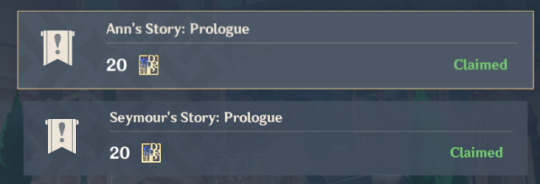
#it was just the prologue#trying to stay calm#so many people are going to unfollow me#because I won't shut up with the lore analysis#narcissenkreuz#everything is sandrone#pause the tragic ending#special thanks to ray for noticing this
26 notes
·
View notes
Text
things i like thinking about: tsukasa definitely voted for tori in the stucopres election in the end. how did he feel about that
#this was surely in my made up knights climax event prologue i should continue this character analysis at some point#mar's midnight rambles
9 notes
·
View notes
Text
i read one chapter of bllb and immediately start mentally zooming around
#i have so much to say about the prologue we might have to revive the analysis channel in the discord server#yay also woo#rchl
33 notes
·
View notes